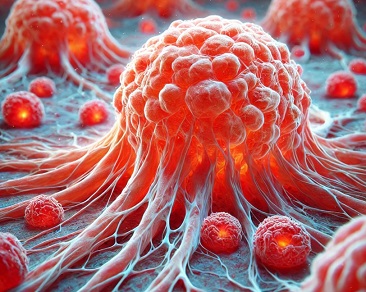Nikhil Prasad Fact checked by:Thailand Medical News Team Jul 02, 2024 1 year, 6 months, 2 hours, 59 minutes ago
Cancer News: A groundbreaking discovery in the fight against breast cancer has been made by researchers at Northeast Normal University in China. The new compound, named AW01178, shows great promise in preventing the spread of breast cancer, a leading cause of cancer-related deaths. This breakthrough findings covered in this
Cancer News report, could lead to more effective treatments and improved survival rates for breast cancer patients.
 A Promising New Drug to Fight Breast Cancer Spread
Image - AI Generated
What is AW01178?
A Promising New Drug to Fight Breast Cancer Spread
Image - AI Generated
What is AW01178?
AW01178 is a novel class I histone deacetylase inhibitor (HDACi). Histone deacetylase inhibitors are compounds that can influence the way genes are expressed by modifying the structure of chromatin, a complex of DNA and protein. This new drug specifically targets breast cancer cells, inhibiting their ability to spread to other parts of the body.
The Role of E-Cadherin
E-cadherin is a protein that plays a crucial role in cell adhesion, keeping cells together and maintaining the structure of tissues. In many cancers, including breast cancer, the expression of E-cadherin is reduced, allowing cancer cells to break away from the primary tumor and spread, or metastasize, to other parts of the body. AW01178 has been shown to upregulate, or increase, the expression of E-cadherin, thereby preventing the cells from spreading.
How Does AW01178 Work?
Researchers used a technique called in-cell Western high-throughput screening to identify AW01178. This technique allows scientists to screen many compounds quickly to find those that have the desired effect on cancer cells. AW01178 was found to increase the levels of E-cadherin in breast cancer cells, both at the mRNA and protein levels. This upregulation of E-cadherin helps to inhibit the process known as epithelial-mesenchymal transition (EMT), which is essential for cancer metastasis.
Impact on Cancer Metastasis
In laboratory tests, AW01178 was effective in reducing the metastasis, or spread, of breast cancer cells. When tested on highly metastatic breast cancer cell lines, AW01178 not only increased the levels of E-cadherin but also decreased the expression of markers associated with EMT, such as fibronectin and vimentin. This suggests that AW01178 can help to keep cancer cells contained, preventing them from migrating to other parts of the body.
Testing in Animal Models
The effectiveness of AW01178 was also tested in animal models. In these tests, mice with breast cancer were treated with AW01178. The results were promising: treated mice had significantly fewer metastatic tumors compared to untreated mice. This indicates that AW01178 could be an effective treatment for preventing the spread of breast cancer in humans.
Minimal Side Effects
t;
One of the challenges with current cancer treatments is the severe side effects they can cause. However, AW01178 appears to have minimal side effects. In tests on normal breast epithelial cells, AW01178 did not significantly affect cell viability, meaning it did not harm healthy cells. This is a crucial advantage, as it suggests that AW01178 could be used to treat cancer without causing significant damage to normal tissues.
Future Prospects
The discovery of AW01178 opens up new possibilities for the treatment of breast cancer. By specifically targeting the mechanisms that allow cancer cells to spread, AW01178 offers a new approach to cancer therapy. While more research is needed to fully understand its potential and to develop it into a clinically usable drug, the initial results are highly encouraging.
Conclusion
The identification of AW01178 is a significant step forward in the fight against breast cancer. This novel compound has shown the ability to inhibit the spread of cancer cells by upregulating E-cadherin and preventing epithelial-mesenchymal transition. With further research and development, AW01178 could become a powerful tool in the treatment of breast cancer, offering hope to patients and their families.
Stay tuned for more updates on this exciting development in cancer research.
The study findings were published in the peer reviewed International Journal of Molecular Sciences.
https://www.mdpi.com/1422-0067/25/13/7234
For the latest
Cancer News, keep on logging to Thailand Medical News.
Read Also:
https://www.thailandmedical.news/news/new-hope-in-the-fight-against-breast-cancer-introducing-p18-the-super-peptide
https://www.thailandmedical.news/news/covid-19-s-effect-on-breast-cancer-cells
